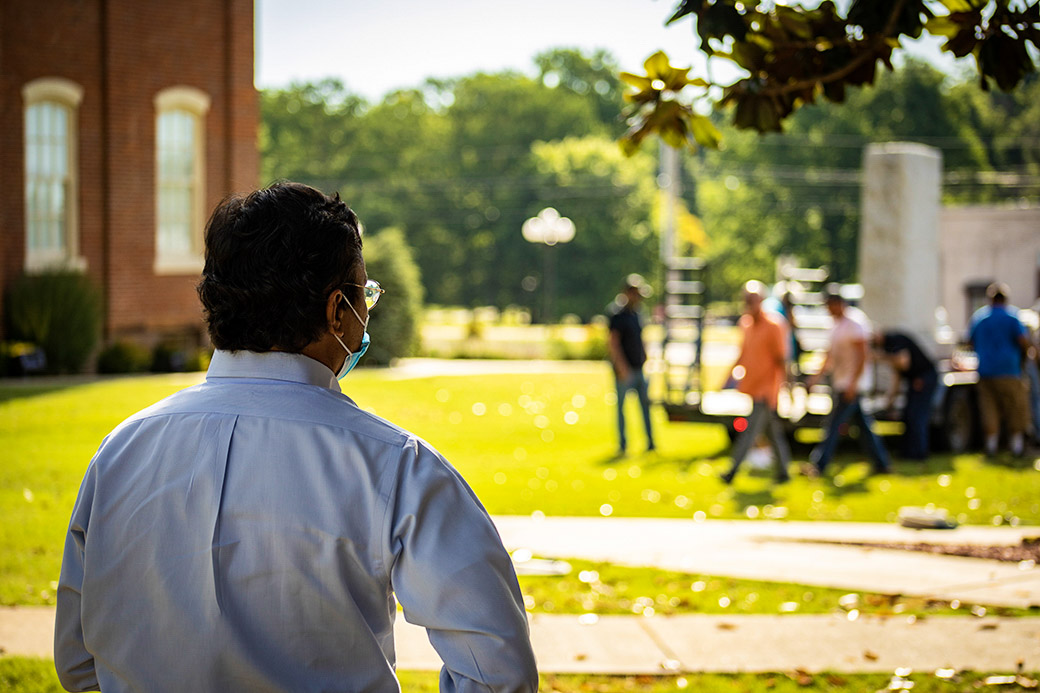Indianz.Com > News > Chuck Hoskin: The Cherokee Nation must honor its word

Honoring our treaty: A nation as good as its word
Wednesday, February 24, 2021
Cherokee Nation
On September 2, 2017, as our tribe’s Secretary of State, I stood on the stage at Cherokee Nation’s annual State of the Nation address. A Cherokee pastor, a full-blood elder fluent in our language, led attendees in singing “Amazing Grace.”
It was a fitting hymn for the moment, written by a 18th century slave trader who found salvation and went on to become an abolitionist.
A day earlier, the Cherokee Nation Supreme Court declared what a federal judge had ruled two days before — that the Treaty of 1866 gave Freedmen and their descendants “all the rights of native Cherokees.” Both courts concluded that Cherokee Nation, a sovereign nation with the right to determine its own standards of citizenship, ceded that right by treaty as it relates to freed slaves of Cherokees and their descendants.
A product of the Reconstruction Era, the Treaty of 1866 between Cherokee Nation and the United States includes provisions on which Cherokee Nation relies today, such as our borders, our relationship with other tribes, and land use, to name a few. The Treaty of 1866 is our last treaty with the United States, and it also reaffirmed important portions of all previous treaties, including the 1835 Treaty of New Echota that provides for our delegate to the U.S. House of Representatives. The Treaty of 1866 remains alive and well, as a federal judge affirmed. Its relevance today impacts everyone within our treaty-based reservation, because our reservation was effectively reaffirmed by the U.S. Supreme Court in last year’s McGirt case. The Treaty of 1866 is a legally binding document that ties together every agreement Cherokee Nation has ever had with the United States. Breaking the Treaty of 1866 could be our undoing. This bears repeating: In the Treaty of 1866, we agreed to free our slaves and give them “all” the rights of native Cherokees. Not some rights. Not rights subject to a popular vote. Not rights with an expiration date. “All the rights.” Any right Cherokee Nation had to enslave human beings, or deny them or their descendants full citizenship, was disposed of by treaty 155 years ago. U.S. Supreme Court Justice Hugo Black once said, “Great nations, like great men, should keep their word.” The United States has broken every treaty it ever had with the Cherokee Nation. Cherokee Nation is a great nation and, at our best, we keep our word.“the [@CherokeeNation Supreme] court has acknowledged, in the strongest terms, our ancestors’ commitment to equality 155 years ago in the Treaty of 1866. My hope is that we all share in that same commitment going forward.” #Equality https://t.co/XGB1WXJ5DK
— Chief Chuck Hoskin, Jr. (@ChuckHoskin_Jr) February 23, 2021

Amazing grace
How sweet the sound
That saved a wretch like me
I once was lost, but now I’m found
Was blind, but now I see
How sweet the sound
That saved a wretch like me
I once was lost, but now I’m found
Was blind, but now I see
Chuck Hoskin Jr. is the 18th elected Principal Chief of the Cherokee Nation, the largest Indian tribe in the United States. He is only the second elected Principal Chief of the Cherokee Nation from Vinita, the first being Thomas Buffington, who served from 1899-1903. Prior to being elected Principal Chief, Hoskin served as the tribe’s Secretary of State. He also formerly served as a member of the Council of the Cherokee Nation, representing District 11 for six years.
Search
Filed Under
Tags
More Headlines
Native America Calling: Three new films offer diverse views of Native life
NAFOA: 5 Things You Need to Know this Week
Chuck Hoskin: Cherokee Nation works toward cure for arthritis
Native America Calling: Protecting young people from the down sides of social media
Native America Calling: New Native voices in poetry
Native America Calling: Indiginerds descend on Oklahoma City
Native America Calling: Political leaders target tribes with unfounded claims
Native America Calling: Tackling a troubling trend for Native women in prison
Chuck Hoskin: Cherokee Nation safeguards our Native language
Native America Calling: How will $1.5 billion in opioid settlement money help the populations hit the hardest?
Native America Calling: Protecting the night sky
Native America Calling: Breaking 100 years of silence over ‘Posey War’
Native America Calling: Dedication to language revitalization
Native America Calling: The Great Alaska Earthquake 60 years later
Native America Calling: Native Bookshelf with Blackfeet author Stephen Graham Jones
More Headlines
NAFOA: 5 Things You Need to Know this Week
Chuck Hoskin: Cherokee Nation works toward cure for arthritis
Native America Calling: Protecting young people from the down sides of social media
Native America Calling: New Native voices in poetry
Native America Calling: Indiginerds descend on Oklahoma City
Native America Calling: Political leaders target tribes with unfounded claims
Native America Calling: Tackling a troubling trend for Native women in prison
Chuck Hoskin: Cherokee Nation safeguards our Native language
Native America Calling: How will $1.5 billion in opioid settlement money help the populations hit the hardest?
Native America Calling: Protecting the night sky
Native America Calling: Breaking 100 years of silence over ‘Posey War’
Native America Calling: Dedication to language revitalization
Native America Calling: The Great Alaska Earthquake 60 years later
Native America Calling: Native Bookshelf with Blackfeet author Stephen Graham Jones
More Headlines